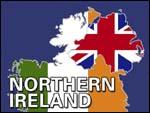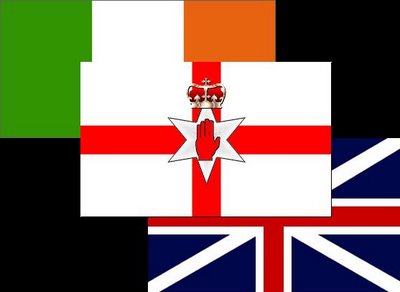


Northern Ireland Faces First Deadline For Self-Rule
 Britain and Ireland have voiced cautious optimisism on the eve of a deadline for Catholic and Protestant parties to sign up to a crunch accord to restore self-rule in Northern Ireland. But analysts warn the first real test will come later this month, when the Catholic Republican Sinn Fein and Protestant pro-London Democratic Unionists (DUP) must start to implement the deal, four years after a joint-rule assembly was suspended. In closed-door talks last month in the Scottish town of St Andrews, London and Dublin hammered out a deal to restore a self-rule administration in the British-run province, still deeply divided despite the end of decades of violence. But the accord, which set out a timetable aimed at having a power-sharing government in place by March 26 next year, needs first of all to be formally backed by all parties before a November 10 deadline -- Today. British and Irish authorities downplayed any sense of concern.
Britain and Ireland have voiced cautious optimisism on the eve of a deadline for Catholic and Protestant parties to sign up to a crunch accord to restore self-rule in Northern Ireland. But analysts warn the first real test will come later this month, when the Catholic Republican Sinn Fein and Protestant pro-London Democratic Unionists (DUP) must start to implement the deal, four years after a joint-rule assembly was suspended. In closed-door talks last month in the Scottish town of St Andrews, London and Dublin hammered out a deal to restore a self-rule administration in the British-run province, still deeply divided despite the end of decades of violence. But the accord, which set out a timetable aimed at having a power-sharing government in place by March 26 next year, needs first of all to be formally backed by all parties before a November 10 deadline -- Today. British and Irish authorities downplayed any sense of concern. "We are hoping tomorrow that we can be in a position to move on to the legislative phase and that both parties will have said that they agree with the St Andrews agreement," said Irish Prime Minister Bertie Ahern. Britain's Northern Ireland office agreed. "We certainly would expect all parties to be positive in their response," a spokesman told AFP, although admitting that as of Today no party had formally given its views. The promise of self-rule was a key plank of the landmark 1998 Good Friday agreement, which ended three decades of "Troubles" that killed more than 3,500 people, many at the hands of the Irish Republican Army, Sinn Fein's paramilitary wing. But self-rule was suspended in 2002 after allegations of an IRA spy ring operating at Stormont Castle, the Belfast seat of administration, and the province has been under direct rule from London ever since. In theory the St Andrews accord -- personally brokered by Ahern and British Prime Minister Tony Blair -- opens the way for a revival of power-sharing in less than six months' time. But a key sticking point in the St Andrews talks was Sinn Fein's refusal to support the Police Service for Northern Ireland (PSNI) -- a successor to the British-run and Protestant-dominated Royal Ulster Constabulary. Many Catholics see the PSNI as still inherently biased, while some allege that it still contains officials and officers responsible for abuse during the Troubles.
"We are hoping tomorrow that we can be in a position to move on to the legislative phase and that both parties will have said that they agree with the St Andrews agreement," said Irish Prime Minister Bertie Ahern. Britain's Northern Ireland office agreed. "We certainly would expect all parties to be positive in their response," a spokesman told AFP, although admitting that as of Today no party had formally given its views. The promise of self-rule was a key plank of the landmark 1998 Good Friday agreement, which ended three decades of "Troubles" that killed more than 3,500 people, many at the hands of the Irish Republican Army, Sinn Fein's paramilitary wing. But self-rule was suspended in 2002 after allegations of an IRA spy ring operating at Stormont Castle, the Belfast seat of administration, and the province has been under direct rule from London ever since. In theory the St Andrews accord -- personally brokered by Ahern and British Prime Minister Tony Blair -- opens the way for a revival of power-sharing in less than six months' time. But a key sticking point in the St Andrews talks was Sinn Fein's refusal to support the Police Service for Northern Ireland (PSNI) -- a successor to the British-run and Protestant-dominated Royal Ulster Constabulary. Many Catholics see the PSNI as still inherently biased, while some allege that it still contains officials and officers responsible for abuse during the Troubles. "We can't get round the fact that the issue of policing has to be resolved," said Jonathan Caine, a former Northern Ireland Office advisor, who forecast that the parties will all meet Friday's deadline, but with reservations. "If Sinn Fein don't agree, direct rule from Westminster will sadly be maintained," he added. Under the timetable set out in the St Andrews Agreement, if there is accord Friday the British government will immediately begin drawing up legislation to implement the accord. Then on November 24 the Belfast assembly will meet to nominate a first minister and deputy first minister -- widely expected to be firebrand DUP leader Ian Paisley and Sinn Fein's chief negotiator Martin McGuinness. But observers say that Paisley will refuse to take office with McGuinness if Sinn Fein has not made unconditional commitments to supporting the police. "It's a huge step for Paisley to agree to be first minister with Martin McGuinness as effectively his co-equal," said an official with long experience of the talks. "Lots of people find it unimaginable. But I think he is prepared to do it -- but it has to be under the right circumstances," he said.
"We can't get round the fact that the issue of policing has to be resolved," said Jonathan Caine, a former Northern Ireland Office advisor, who forecast that the parties will all meet Friday's deadline, but with reservations. "If Sinn Fein don't agree, direct rule from Westminster will sadly be maintained," he added. Under the timetable set out in the St Andrews Agreement, if there is accord Friday the British government will immediately begin drawing up legislation to implement the accord. Then on November 24 the Belfast assembly will meet to nominate a first minister and deputy first minister -- widely expected to be firebrand DUP leader Ian Paisley and Sinn Fein's chief negotiator Martin McGuinness. But observers say that Paisley will refuse to take office with McGuinness if Sinn Fein has not made unconditional commitments to supporting the police. "It's a huge step for Paisley to agree to be first minister with Martin McGuinness as effectively his co-equal," said an official with long experience of the talks. "Lots of people find it unimaginable. But I think he is prepared to do it -- but it has to be under the right circumstances," he said.

 Britain and Ireland have voiced cautious optimisism on the eve of a deadline for Catholic and Protestant parties to sign up to a crunch accord to restore self-rule in Northern Ireland. But analysts warn the first real test will come later this month, when the Catholic Republican Sinn Fein and Protestant pro-London Democratic Unionists (DUP) must start to implement the deal, four years after a joint-rule assembly was suspended. In closed-door talks last month in the Scottish town of St Andrews, London and Dublin hammered out a deal to restore a self-rule administration in the British-run province, still deeply divided despite the end of decades of violence. But the accord, which set out a timetable aimed at having a power-sharing government in place by March 26 next year, needs first of all to be formally backed by all parties before a November 10 deadline -- Today. British and Irish authorities downplayed any sense of concern.
Britain and Ireland have voiced cautious optimisism on the eve of a deadline for Catholic and Protestant parties to sign up to a crunch accord to restore self-rule in Northern Ireland. But analysts warn the first real test will come later this month, when the Catholic Republican Sinn Fein and Protestant pro-London Democratic Unionists (DUP) must start to implement the deal, four years after a joint-rule assembly was suspended. In closed-door talks last month in the Scottish town of St Andrews, London and Dublin hammered out a deal to restore a self-rule administration in the British-run province, still deeply divided despite the end of decades of violence. But the accord, which set out a timetable aimed at having a power-sharing government in place by March 26 next year, needs first of all to be formally backed by all parties before a November 10 deadline -- Today. British and Irish authorities downplayed any sense of concern. "We are hoping tomorrow that we can be in a position to move on to the legislative phase and that both parties will have said that they agree with the St Andrews agreement," said Irish Prime Minister Bertie Ahern. Britain's Northern Ireland office agreed. "We certainly would expect all parties to be positive in their response," a spokesman told AFP, although admitting that as of Today no party had formally given its views. The promise of self-rule was a key plank of the landmark 1998 Good Friday agreement, which ended three decades of "Troubles" that killed more than 3,500 people, many at the hands of the Irish Republican Army, Sinn Fein's paramilitary wing. But self-rule was suspended in 2002 after allegations of an IRA spy ring operating at Stormont Castle, the Belfast seat of administration, and the province has been under direct rule from London ever since. In theory the St Andrews accord -- personally brokered by Ahern and British Prime Minister Tony Blair -- opens the way for a revival of power-sharing in less than six months' time. But a key sticking point in the St Andrews talks was Sinn Fein's refusal to support the Police Service for Northern Ireland (PSNI) -- a successor to the British-run and Protestant-dominated Royal Ulster Constabulary. Many Catholics see the PSNI as still inherently biased, while some allege that it still contains officials and officers responsible for abuse during the Troubles.
"We are hoping tomorrow that we can be in a position to move on to the legislative phase and that both parties will have said that they agree with the St Andrews agreement," said Irish Prime Minister Bertie Ahern. Britain's Northern Ireland office agreed. "We certainly would expect all parties to be positive in their response," a spokesman told AFP, although admitting that as of Today no party had formally given its views. The promise of self-rule was a key plank of the landmark 1998 Good Friday agreement, which ended three decades of "Troubles" that killed more than 3,500 people, many at the hands of the Irish Republican Army, Sinn Fein's paramilitary wing. But self-rule was suspended in 2002 after allegations of an IRA spy ring operating at Stormont Castle, the Belfast seat of administration, and the province has been under direct rule from London ever since. In theory the St Andrews accord -- personally brokered by Ahern and British Prime Minister Tony Blair -- opens the way for a revival of power-sharing in less than six months' time. But a key sticking point in the St Andrews talks was Sinn Fein's refusal to support the Police Service for Northern Ireland (PSNI) -- a successor to the British-run and Protestant-dominated Royal Ulster Constabulary. Many Catholics see the PSNI as still inherently biased, while some allege that it still contains officials and officers responsible for abuse during the Troubles. "We can't get round the fact that the issue of policing has to be resolved," said Jonathan Caine, a former Northern Ireland Office advisor, who forecast that the parties will all meet Friday's deadline, but with reservations. "If Sinn Fein don't agree, direct rule from Westminster will sadly be maintained," he added. Under the timetable set out in the St Andrews Agreement, if there is accord Friday the British government will immediately begin drawing up legislation to implement the accord. Then on November 24 the Belfast assembly will meet to nominate a first minister and deputy first minister -- widely expected to be firebrand DUP leader Ian Paisley and Sinn Fein's chief negotiator Martin McGuinness. But observers say that Paisley will refuse to take office with McGuinness if Sinn Fein has not made unconditional commitments to supporting the police. "It's a huge step for Paisley to agree to be first minister with Martin McGuinness as effectively his co-equal," said an official with long experience of the talks. "Lots of people find it unimaginable. But I think he is prepared to do it -- but it has to be under the right circumstances," he said.
"We can't get round the fact that the issue of policing has to be resolved," said Jonathan Caine, a former Northern Ireland Office advisor, who forecast that the parties will all meet Friday's deadline, but with reservations. "If Sinn Fein don't agree, direct rule from Westminster will sadly be maintained," he added. Under the timetable set out in the St Andrews Agreement, if there is accord Friday the British government will immediately begin drawing up legislation to implement the accord. Then on November 24 the Belfast assembly will meet to nominate a first minister and deputy first minister -- widely expected to be firebrand DUP leader Ian Paisley and Sinn Fein's chief negotiator Martin McGuinness. But observers say that Paisley will refuse to take office with McGuinness if Sinn Fein has not made unconditional commitments to supporting the police. "It's a huge step for Paisley to agree to be first minister with Martin McGuinness as effectively his co-equal," said an official with long experience of the talks. "Lots of people find it unimaginable. But I think he is prepared to do it -- but it has to be under the right circumstances," he said.
































<< Home